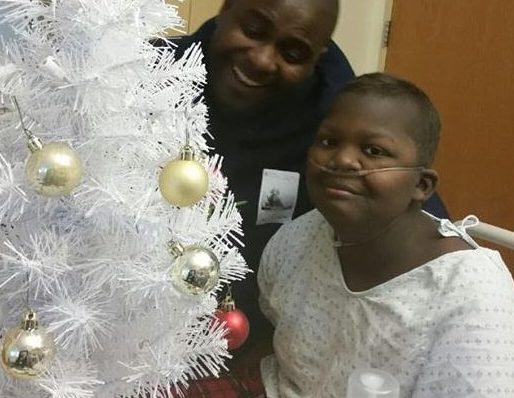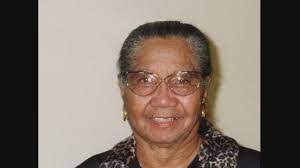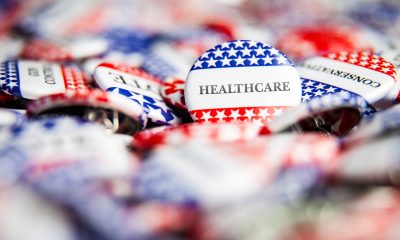Featured
12 Year Old East Bay Child Seeks Bone Marrow Match to Save His Life

By Sally Douglass Arce
Justin is a 12-year-old African American boy living in the East Bay, who is in a fight for his life.
Last year in February, he was diagnosed with lymphoma. Justin obtained remission, but relapsed in January 2017.
He is now diagnosed with leukemia. In some cases, lymphoma is known to transform into leukemia.
Justin and thousands of people diagnosed with a blood cancer like leukemia and lymphoma, sickle cell, and other life-threatening diseases need a bone marrow transplant in order to live. First, a marrow match must be found. Then, the transplant takes place.
A matching donor will be someone of the same ethnic heritage. None of Justin’s family members are a match. So, an unrelated donor will be his only hope of a cure. He depends on someone like you. You have the power to help, the power to give hope!
“It’s so important for African Americans to join the registry because patients like Justin are waiting for an African American donor to save their life,” says Lakeshia Phillips-Marshall, Justin’s mother.
Commit to being a donor for Justin or other patients like him. Currently there are 14,000 people in need of a donor.
Registering is simple –complete a questionnaire and swab the inside of your cheek. African Americans ages 18-44 are urged to join the Be the Match® registry. To register online, click here.
Fifty percent of the registered donors, who are called to donate to a specific patient, say no. In the African American community, the percentage is worse.
“This means patients are dying unnecessarily,” says Carol Gillespie, executive director of the Asian American Donor Program. “It’s a numbers game. With more African Americans on the registry, there is a better chance to find a match. This is the only way to save lives.”
Justin is the middle child of three brothers. He is a Golden State Warriors fan and loves sports. Justin’s favorite musical artist is Speaker Knockerz. He likes dancing. At school, his favorite subjects are science and history. As for his dreams for his future, he’d like to play in the NBA or be a dancer.
“Justin is the peacemaker,” says Phillips-Marshall. “He’s very kind hearted and is loved by everybody. He doesn’t have a mean bone in his body. That’s what makes this so hard. The Justin that we know is fun loving, the popular kid. Everyone wants Justin at their party. They want Justin as their friend. With him in the hospital, it’s really hard.”
Because the markers used in matching are inherited, patients are more likely to match someone from their own race or ethnicity. Adding more bone marrow donors from diverse racial and ethnic backgrounds to the Be The Match Registry® increases the likelihood that patients will find the match they need. Your heritage can make all the difference.
Only about 8 percent of the nation’s 12.5 million registered bone-marrow donors are African American, which makes Justin’s odds of finding a bone marrow match quite slim.
If you would like to register in Justin’s name, go online here.
To find a registration drive in the Bay Area, call 1-800-593-6667 or go to www.aadp.org/drive/
California Black Media
Gov. Newsom Goes to Washington to Advocate for California Priorities
Gov. Gavin Newsom traveled to Washington, D.C., for meetings with senior Biden-Harris Administration officials and members of California’s congressional delegation. During the week, he pushed for increased resources to improve public safety and quality of life in California.

By Bo Tefu, California Black Media
Gov. Gavin Newsom traveled to Washington, D.C., for meetings with senior Biden-Harris Administration officials and members of California’s congressional delegation.
During the week, he pushed for increased resources to improve public safety and quality of life in California.
“California is continuing our work to secure additional tools and resources to improve access to health care, clean air and water, and secure critical funding to support communities recovering from disasters,” said Newsom.
At the White House, Newsom met with President Joe Biden and key officials, advocating for disaster relief funding, healthcare expansion, and environmental protection. He also engaged in discussions with senior Biden-Harris officials, including Interior Secretary Deb Haaland, to address water quality improvements and the San Luis Dam project, which will support water supplies for two million Californians.
“Building on our strong partnership with the Biden-Harris Administration, California is working closely with the White House over the next two months to deliver the critical protections and resources our communities need,” Newsom said.
On Capitol Hill, Newsom met with California Senators Alex Padilla and Adam Schiff, along with other Congressional leaders, to emphasize the need to approve pending disaster funding, healthcare programs, and environmental protections. He also previewed California’s upcoming special session to proactively address potential federal challenges when President-elect Donald Trump is sworn into office.
Newsom’s discussions also focused on securing Medicaid waivers from the Center for Medicare & Medicaid Services (CMS) to enhance behavioral health services and reduce homelessness. The state seeks approval for the BH-CONNECT waiver, which would address behavioral health and homelessness, and the MCO Tax Waiver, which would provide over $20 billion for Medi-Cal to improve healthcare access.
Additionally, California is pushing for Clean Air Act waivers from the U.S. Environmental Protection Agency (EPA), which are crucial for enforcing air quality regulations. These measures are projected to prevent 11,000 premature deaths and provide $116 billion in health benefits over the next three decades, according to the Governor’s office.
California Black Media
California to Offer $43.7 Million in Federal Grants to Combat Hate Crimes
Gov. Gavin Newsom has announced that 311 California nonprofit and faith-based organizations, including those representing communities targeted by hate crimes, will receive over $43.7 million in federal funding through the Nonprofit Security Grant Program. The funding aims to enhance security measures such as reinforced doors, access control systems, and lighting to protect against hate-based violence.

By Bo Tefu, California Black Media
Gov. Gavin Newsom has announced that 311 California nonprofit and faith-based organizations, including those representing communities targeted by hate crimes, will receive over $43.7 million in federal funding through the Nonprofit Security Grant Program.
The funding aims to enhance security measures such as reinforced doors, access control systems, and lighting to protect against hate-based violence.
“An attack against any community is an attack against our entire state and our values. We will protect the ability of every Californian to worship, love, and gather safely without fear of hate or violent attacks. California is continuing to safeguard all communities, including those most at risk,” said Newsom.
California receives 10% of the national allocation, the highest of any state. This funding comes in addition to $76 million in state funding for similar security improvements announced in July 2024. In total, California has invested over $230 million since 2015 to safeguard vulnerable communities.
“California is dedicated to helping our communities stay safe from violent hate crimes and get access to essential financial funding to support those efforts,” said Cal Office of Emergency Services (OES) Director Nancy Ward.
The grants are particularly important as hate crimes, especially against Jewish, Muslim, LGBTQ+, and Black communities, have seen an increase. In response, California has also launched initiatives like the CA vs Hate hotline and website, providing a platform for reporting hate incidents anonymously. Newsom’s administration continues to prioritize the safety of all Californians, with ongoing efforts to combat discrimination and hate violence.
California Black Media
California Reports First Case of Mpox in the United States
On Nov. 16, the California Department of Public Health (CDPH), reported the first known case of clade 1 Mpox, previously known as Monkeypox, in the United States. However, the risk to the public remains low, according to the CDPH.

By Bo Tefu, California Black Media
On Nov. 16, the California Department of Public Health (CDPH), reported the first known case of clade 1 Mpox, previously known as Monkeypox, in the United States.
However, the risk to the public remains low, according to the CDPH.
“This case was confirmed in an individual who recently traveled from Africa and is related to the ongoing outbreak of clade I mpox in Central and Eastern Africa,” reads a statement the CDPH released.
According to the DDPH, “The affected individual received health care in San Mateo County based on their travel history and symptoms. The individual is isolating at home and recovering.”
Public health workers are also conducting a contact tracing exercise and reaching out to people who have been in close proximity to the affected person.
“The mpox specimens from the traveler are being sent to the CDC for further laboratory testing,” the CDPH press release continues.
Californians can take a number of steps to prevent Mpox. Here’s more information:
Preventing Mpox Infection
It appears clade I mpox spreads in a similar manner as clade II mpox, through close (skin-skin), intimate and sexual contact. The identification of a potentially more severe mpox version in the United States is a good reminder for individuals who have certain risk factors to take preventive action, including:
- Getting vaccinated if you may be at risk for mpox. For the greatest protection, make sure you get both doses of the vaccine. Find mpox vaccine (JYNNEOS) near you.
- Taking precautions if you were exposed to mpox. Get the mpox vaccine before symptoms develop and consider avoiding intimate contact with others for 21 days. Watch yourself for symptoms and get tested if they develop.
- Preventing spread if you have been told you have mpox. Avoid contact with others until the rash is healed, clean and disinfect shared areas in the home, and notify people who may have been exposed.
- Talking to your sexual partner(s).
- Avoiding skin-to-skin contact with those who have a rash or sores that look like mpox.
- Not sharing items with someone who has mpox.
- Washing your hands often.
- Protecting yourself when caring for someone with mpox by using masks, gowns and gloves.
Visit the CDPH website to learn more about Mpox with Sexual Health Toolkits and a Campaign Materials Page.
-

 Activism4 weeks ago
Activism4 weeks ago‘Jim Crow Was and Remains Real in Alameda County (and) It Is What We Are Challenging and Trying to Fix Every Day,’ Says D.A. Pamela Price
-

 Bay Area4 weeks ago
Bay Area4 weeks agoIn the City Attorney Race, Ryan Richardson Is Better for Oakland
-

 Activism4 weeks ago
Activism4 weeks agoOakland Post: Week of October 30 – November 5, 2024
-

 Alameda County3 weeks ago
Alameda County3 weeks agoD.A. Price Charges Coliseum Flea Market Vendors in Organized Retail Theft Case
-

 Activism4 weeks ago
Activism4 weeks ago‘Criminal Justice Reform Is the Signature Civil Rights Issue of Our Time,’ says D.A. Pamela Price
-

 Activism2 weeks ago
Activism2 weeks agoLIVE! — TOWN HALL ON RACISM AND ITS IMPACT — THURS. 11.14.24 5PM PST
-

 Bay Area3 weeks ago
Bay Area3 weeks agoOakland Mayor Sheng Thao’s Open Letter to Philip Dreyfuss, Recall Election’s Primary Funder
-

 Activism4 weeks ago
Activism4 weeks ago“Two things can be true at once.” An Afro-Latina Voter Weighs in on Identity and Politics























































